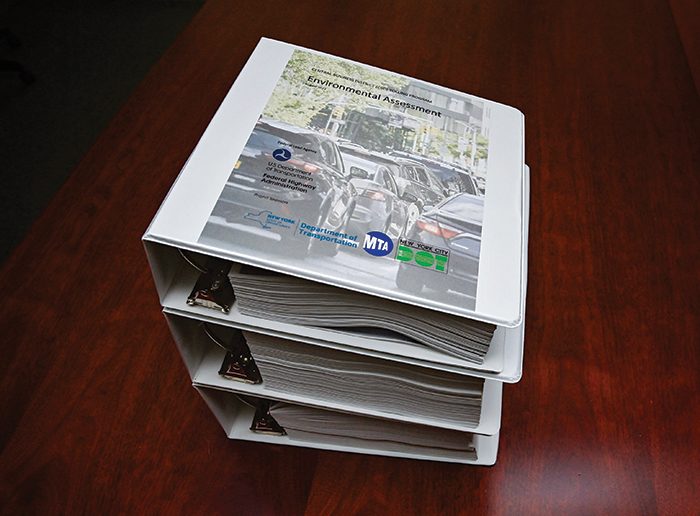Photo Courtesy of Marc A. Hermann
MTA releases the Environmental Assessment for the Central Business Tolling District Program in a folder presented to representatives of the media.
By Forum Staff
The Federal Highway Administration, State Department of Transportation, MTA Triborough Bridge and Tunnel Authority and City Department of Transportation on Wednesday released an Environmental Assessment of the proposed Central Business District Tolling Program (CBDTP) in Manhattan, known commonly as congestion pricing. The Environmental Assessment document is available for review online at https://mta.info/CBDTP and in more than 60 locations throughout the New York City metropolitan region (locations may be found on the website).
The document evaluates the effects of the program compared with taking no action. The document finds that central business district tolling would accomplish the goal of New York State’s MTA Reform and Traffic Mobility Act of reducing traffic congestion in the Manhattan Central Business District (CBD) and raising revenue for investment in transit.
The Environmental Assessment (EA), based on modeling of seven tolling scenarios within the CBD Tolling Alternative, with different combinations of potential exemptions, discounts and/or crossing credits, and the resultant toll rates. The EA finds the program would result in either beneficial effects or no adverse effects for the majority of topics studied, including regional air quality, regional transportation, and parking. Where potential adverse effects were identified, mitigation is provided.
The assessment found that 85% of existing work trips to the CBD are made by transit, 5% by car from New York City, 3% by car from New York suburban counties, 3% by car from New Jersey, 0.2% by car from Connecticut, and 4% by other modes, including taxis, for-hire vehicles, bicycling and walking.
Among the key findings of the assessment are:
Implementation of tolls would achieve the purpose and need of the project – to reduce traffic congestion in the Manhattan CBD in a manner that will generate revenue for future transportation improvements.
With initiation of the program, the number of vehicles entering the CBD would decline by 15.4% to 19.9%, depending on the tolling scenario. Traffic elsewhere in the region would change between -1.5% to 0.2%, depending on the location and the tolling scenario.
Air quality would improve overall, with greater beneficial effects within and closer to the CBD.
Reduction in traffic would result in increased reliability of bus service
Increase in transit ridership of 1% to 2%
The project partners received more than 7,300 comments in early enhanced outreach as the Environmental Assessment was being prepared. Seeking feedback on the document now that the Environmental Assessment has been released, the project partners have outlined a series of virtual public hearings that will take place from Aug. 25 through Aug. 31, as well as a meeting of the Environmental Justice Stakeholder Working Group, on Aug. 19, and a meeting of the Environmental Justice Technical Advisory Group, for Aug. 22. The project partners are accepting comments online, via email, mail, voicemail and fax.
Following the public review period, the Federal Highway Administration (FHWA) will determine whether establishment of the program would result in significant effects in addition to the widespread benefits detailed in the assessment. The FHWA will issue one of two documents responding to the environmental assessment: either a Finding of No Significant Impact (FONSI), establishing that any adverse effects are not significant or can be mitigated below significant level, or, if determined that there are significant effects that cannot be mitigated, a request for an Environmental Impact Statement (EIS) requiring further study of the proposed program.

